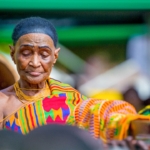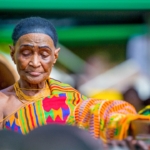
The passing of Nana Konadu Yiadom III, the Asantehemaa, is not just the end of a long life but a profound seismic moment of transition for the Asante Kingdom and the Republic of Ghana. Her death at 98 years old, after a reign marked by grace and wisdom, highlights the enduring power and relevance of traditional institutions in a rapidly changing world. The sorrow expressed is not just for a Queen Mother, but for a mother of the nation, a figure whose counsel and character touched lives far beyond the walls of Manhyia Palace.
It is important to note that while the Asantehene, Otumfuo Osei Tutu II, officially announced her death to the Asanteman Traditional Council on Monday, August 11, 2025, she had passed away four days earlier, on Thursday, August 7, 2025. This customary delay between the passing of a royal and the public announcement allows for the observation of specific traditional rites and protocols that precede such a significant public declaration.
The Heartbeat of Asanteman
To understand the weight of this loss, one must grasp the essence of the Asante Kingdom, a historic empire built on a unique blend of spiritual power and political acumen. The Asante, a subgroup of the Akan people, built a powerful empire rooted in a rich culture defined by the Sika Dwa (Golden Stool). The Golden Stool, believed to have descended from the heavens, is the spiritual and political heart of the kingdom, embodying the soul of the Asante nation.
The Asantehemaa, Nana Konadu Yiadom III, was the custodian of this history and a living link to the ancestors who built the empire. Her role as the ultimate arbiter of royal lineage is not a relic of the past but a vibrant, essential part of Asante governance.
The official statement from the Manhyia Palace underscored her role, noting, “Her presence at the Manhyia Palace was a pillar of continuity and tradition.” This quote reinforces the deep personal and political relationship she shared with the Asantehene. Her death thus leaves a significant void, a hushed silence, a pause in the heartbeat of the kingdom, as the nation prepares to select a new guardian of its spiritual and cultural heritage.
A Comparative Crown: The Asantehemaa and the British Queen Mother
In many ways, the role of the Asantehemaa mirrors that of a European Queen Mother, yet it is distinct in its power and purpose. While a British Queen Mother, such as the late Queen Elizabeth the Queen Mother, served as a revered matriarch and symbol of national continuity, her role was largely ceremonial.
The Asantehemaa’s position, however, is a coequal and complementary pillar of power to the Asantehene. In the Asante’s matrilineal system, her authority is not simply derived from being a king’s mother; she is the ‘Oyoko Abusua Panyin,’ the head of the royal clan, and possesses the ultimate authority to nominate a new Asantehene.
This gives her a direct and decisive say in the succession process, a power not held by her British counterpart. Her passing, therefore, represents not just the loss of a revered matriarch but the very real and immediate political process of finding a new leader for the royal clan.
Succession and the Continuity of Tradition
The process of selecting the next Asantehemaa is a powerful demonstration of the kingdom’s resilience and commitment to its traditions. Unlike many monarchies where succession is linear, the Asante system is a meticulous process of selection from the royal lineage. The new Asantehemaa will be a woman of character, known for her wisdom, integrity, and deep understanding of Asante customs. She will be the one entrusted with the immense responsibility of advising the Asantehene and preserving the sanctity of the Golden Stool.
The choice is a powerful statement about the continuity of the kingdom, a reminder that while individuals pass on, the institution endures. The late Queen Mother’s life story, rising from a woman who engaged in catering and petty trading to a revered monarch, serves as an inspiration and a poignant example of the Asante system’s ability to find leadership from within its people, regardless of their social standing before their ascension.
A National Moment of Reflection
This profound loss of a revered matriarch comes at a time of deep national sorrow. Ghana is already in mourning following the tragic military helicopter crash on Wednesday, August 6, 2025, which killed eight people, including two government ministers. Just days before, the nation was shaken by the death of legendary Highlife musician Charles Kwadwo Fosu, popularly known as Daddy Lumba, on July 26, 2025. The passing of the Asantehemaa therefore deepens a period of national grief, serving as a powerful reminder of Ghana’s resilience and its deep-seated traditions of collective mourning and remembrance in the face of profound loss.
In announcing her passing to the Asanteman Traditional Council, the Asantehene, Otumfuo Osei Tutu II, expressed the profound sorrow felt by the entire kingdom, noting, “We have lost not just a Queen Mother, but a revered mother whose counsel was vital to our strength and unity.”
The outpouring of tributes, including those from former Vice President Dr. Mahamudu Bawumia, underscores the national significance of the Asantehemaa. Dr. Bawumia’s heartfelt words, “Nana, throughout her reign, remained an enduring symbol of unity, grace, and candour,” speak to a legacy that transcends ethnic and political divides.
Another prominent voice, the NPP (New Patriotic Party) presidential hopeful Kennedy Agyapong, described her as a “mother to us all” and highlighted her “unwavering fidelity to Asanteman.” Her role was a bridge between the traditional and the modern, a figure of stability in a dynamic democratic landscape.
It is noteworthy that the President of Ghana did not issue an immediate public statement on the death of the Asantehemaa, nor did the National Democratic Congress (NDC) officially react to the news. The President’s attention and national discourse were primarily focused on the military helicopter crash that occurred just days earlier, a tragedy which led to the declaration of a national mourning period and consumed the immediate public statements of both the presidency and the NDC.
For Ghanaians from all walks of life, her passing serves as a moment of national reflection. It reminds us that our strength as a nation is derived from the diverse and rich cultures that coexist within our borders. The mourning period is not just for the Asante people; it is a time for all Ghanaians to honor a life dedicated to service, and to appreciate the intricate mosaic of traditions that make up the national identity.
A Legacy that Endures
Born Nana Ama Konadu Yiadom in 1927 to the 13th Asantehemaa, Nana Afia Kobi Serwaa Ampem II, and Opanin Kofi Foffie, also known as Koofie or Keewuo of Besease near Atimatim, a suburb of Kumasi, her story is a testament to the power of destiny and the strength of character.
As a mother, a queen, and a leader, she dedicated her life to her people. Her philanthropic efforts and her unwavering commitment to justice earned her deep respect. Her court was known for its fairness and her counsel was sought by many. According to Safo Kantanka, a historian at the Manhyia Palace, “she was fair and firm, honest, and a good advisor.” He also pointed to a school named in her honor as a testament to her community impact.
Beyond the words of public figures and historians, her life story is also a source of inspiration for ordinary Ghanaians. Akosua Afrifa, a resident in Kumasi, noted, “She was one of us, a woman who rose to greatness without forgetting her roots. Her kindness was felt by everyone, not just the royals.”
Her passing is a profound loss, but her legacy is indelibly etched into the very fabric of the Asante Kingdom and the heart of Ghana. It is a legacy not only of tradition and authority but of a profound, motherly love for her people—a guiding light that will continue to inspire a nation to find strength in its heritage and unity in its diversity. In her wisdom and grace, Nana Konadu Yiadom III was a link to the past who paved a way for the future.
As a testament to her enduring legacy and the profound respect she commanded, the Asantehene, Otumfuo Osei Tutu II, has announced a one-week observation ceremony. This traditional rite, to be held at the Manhyia Palace on Thursday, August 21, 2025, is more than a memorial; it is the first formal step in the succession process. This solemn gathering of mourners from across Ghana and beyond will honor the monarch who dedicated over eight years of service to her people and, in doing so, will uphold the cherished customs that she so tirelessly preserved for the future of the Asante Kingdom.
- President Commissions 36.5 Million Dollars Hospital In The Tain District
- You Will Not Go Free For Killing An Hard Working MP – Akufo-Addo To MP’s Killer
- I Will Lead You To Victory – Ato Forson Assures NDC Supporters
Visit Our Social Media for More




